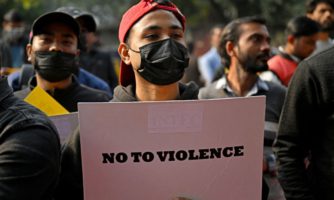The Government of India must prioritize humanitarian aid and immediately implement a clear, inclusive and time-bound plan for the safe and voluntary return of communities displaced by ethnic violence in Manipur, said Amnesty International, ahead of the second anniversary of the outbreak of violence.
Since violence erupted on 3 May 2023 between the Meitei community and Kuki and other tribal hill communities, more than 50,000 internally displaced people (IDPs) from both communities continue to remain in relief camps across the state, living in inhumane conditions with limited access to healthcare, sanitation, and adequate nutrition.
“It is unacceptable that the Indian government has failed to address the humanitarian needs and implement a comprehensive rehabilitation policy for displaced communities who remain in relief camps two years since the start of the ethnic violence in Manipur. This inaction has left tens of thousands in limbo, forced to endure life in inhumane conditions with no end in sight,” said Aakar Patel, chair of board, Amnesty International India.
“Despite the devastating impact of the violence, including the loss of 260 lives, there has been no meaningful progress toward justice and accountability. The rehabilitation policy must also prioritize accountability for the grave human rights violations and abuses committed since May 2023.”
According to the latest government data as per sources, more than 58,000 people are living in 281 relief camps across the state. Many others have fled to states like Mizoram and Meghalaya. Despite the imposition of President’s rule in Manipur in February 2025 which suspended the state government and extended central government’s rule in the state, the conditions have not improved.
Fear and insecurity preventing return
Key stakeholders in Manipur told Amnesty International that while many IDPs are desperate to return home because of the terrible living conditions, fear and insecurity persist. Numerous homes have been destroyed, while others remain occupied by vigilante groups, making return impossible without proper state intervention and guarantees of safety.
Babloo Loitongbam, a human rights defender and lawyer from Imphal, said: “Thousands are still unable to return home – not by choice, but due to ongoing fear and insecurity. As delays persist, frustration and resentment continue to grow among those affected… potentially creating a far more volatile and dangerous situation.”
A community worker told Amnesty International: “If they go back to their homes, how can they sleep peacefully in a house where the roof and the walls are riddled with bullet holes? They need security and protection. And not many can afford to reconstruct their homes without assistance from the authorities.”
Inhuman conditions in relief camps
While the Union Home Ministry announced that it has provided INR 21,700,000 (256470 USD) for relief and rehabilitation during the 2024-25 fiscal year, the Home Minister Amit Shah on 3 April said that ‘discussions are ongoing’ regarding a rehabilitation package for the internally displaced people.
A community worker from a relief camp, speaking on the condition of anonymity, told Amnesty International: “The health facilities in these camps are very bad. We regularly see outbreaks of measles, dysentery and fever…There are also people with illnesses like cancer and tuberculosis and many who need dialysis treatment. The only government hospital nearby doesn’t have the capacity to treat these patients and there aren’t many specialist doctors, which is worrying. We are getting some assistance from civil society and philanthropic organizations but nothing much from the state.”
Another community worker told Amnesty International: “Sanitation is a big problem in these camps. More than 100 families are using two to three makeshift toilets right now. The living conditions are pathetic, cramped and very suffocating. My concern is also that they are provided with two meals a day and the quality of the food is not good.”
Under international law, IDPs have the right to access to adequate housing, water, sanitation, health and other essential services, without discrimination, as anyone else living in India. The denial of access to these essential rights is a violation of the International Covenant on Economic, Social and Cultural Rights (ICESCR), which India ratified in 1979 and the UN Guiding Principles on Internal Displacement.
Failure to ensure accountability
Since May 2023, homes, businesses, villages, and places of worship have been burned, attacked, looted, and vandalized in the ongoing ethnic violence. Two years on, the authorities have failed to bring the suspected perpetrators of the human rights violations to account, and to provide access to justice and effective remedies for victims, thereby contributing to impunity.
Benjamin Mate, Chairman of the Kuki Organisation for Human Rights Trust, said: “To ensure true progress in Manipur, the Government of India must appoint an independent commission to thoroughly investigate the role of senior officials, state bureaucrats, police officials, and armed groups during the ethnic violence over the past two years. Accountability is essential, and only through such a transparent and impartial inquiry can justice be delivered to the victims.”
“The BJP-led administrations at both the state and central levels have not succeeded in bringing an end to the ongoing violence in Manipur. By consistently failing to hold those suspected of serious human rights violations accountable, the government risks signaling that such impunity will persist – ultimately paving the way for further abuses which unfortunately will impede any proposed rehabilitation policy in the coming days,” said Aakar Patel.

